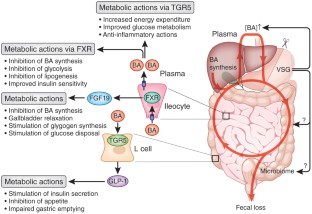Bariatric surgery reduces the weight of morbidly obese individuals and exerts beneficial effects on associated metabolic disorders such as type 2 diabetes. However, despite growing traction in this area of metabolic research, questions remain as to the mechanisms that lead to these benefits. New findings propose that the bile acid–activated nuclear receptor FXR mediates the metabolic improvement seen after one particular bariatric surgery approach and that this may involve alterations in the microbiome.
This is a preview of subscription content, access via your institution
Relevant articles
Open Access articles citing this article.
-
“Dysfunctions” induced by Roux-en-Y gastric bypass surgery are concomitant with metabolic improvement independent of weight loss
Cell Discovery Open Access 28 January 2020
-
Intestine-selective farnesoid X receptor inhibition improves obesity-related metabolic dysfunction
Nature Communications Open Access 15 December 2015
Access options
Subscribe to this journal
Receive 12 print issues and online access
$209.00 per year
only $17.42 per issue
Buy this article
- Purchase on Springer Link
- Instant access to full article PDF
Prices may be subject to local taxes which are calculated during checkout

References
Yanovski, S.Z. & Yanovski, J.A. J. Am. Med. Assoc. 311, 74–86 (2014).
Schauer, P.R. et al. N. Engl. J. Med. 366, 1567–1576 (2012).
Karamanakos, S.N. et al. Ann. Surg. 247, 401–407 (2008).
Ryan, K.K. et al. Nature, doi:10.1038/nature13135 (26 March 2014).
Lefebvre, P. et al. Physiol. Rev. 89, 147–191 (2009).
Ridlon, J.M. et al. J. Lipid Res. 47, 241–259 (2006).
Patti, M.E. et al. Obesity (Silver Spring) 17, 1671–1677 (2009).
Kohli, R. et al. J. Clin. Endocrinol. Metab. 98, E708–E712 (2013).
Sinal, C.J. et al. Cell 102, 731–744 (2000).
Kok, T. et al. J. Biol. Chem. 278, 41930–41937 (2003).
Cariou, B. et al. J. Biol. Chem. 281, 11039–11049 (2006).
Zhang, Y. et al. Mol. Endocrinol. 26, 272–280 (2012).
Prawitt, J. et al. Diabetes 60, 1861–1871 (2011).
Cariou, B. et al. FEBS Lett. 581, 5191–5198 (2007).
Dewulf, E.M. et al. Gut 62, 1112–1121 (2013).
Li, F. et al. Nat. Commun. 4, 2384 (2013).
Author information
Authors and Affiliations
Corresponding author
Ethics declarations
Competing interests
The authors declare no competing financial interests.
Rights and permissions
About this article
Cite this article
Kuipers, F., Groen, A. FXR: the key to benefits in bariatric surgery?. Nat Med 20, 337–338 (2014). https://doi.org/10.1038/nm.3525
Published:
Issue Date:
DOI: https://doi.org/10.1038/nm.3525
This article is cited by
-
“Dysfunctions” induced by Roux-en-Y gastric bypass surgery are concomitant with metabolic improvement independent of weight loss
Cell Discovery (2020)
-
Intestinal and Gastric Origins for Diabetes Resolution After Bariatric Surgery
Current Obesity Reports (2018)
-
Comparative Effects of Bile Diversion and Duodenal-Jejunal Bypass on Glucose and Lipid Metabolism in Male Diabetic Rats
Obesity Surgery (2016)
-
Intestine-selective farnesoid X receptor inhibition improves obesity-related metabolic dysfunction
Nature Communications (2015)
-
Nonalcoholic fatty liver disease
Nature Reviews Disease Primers (2015)
